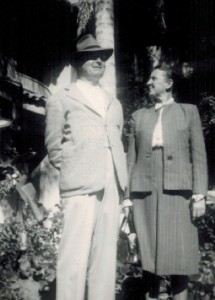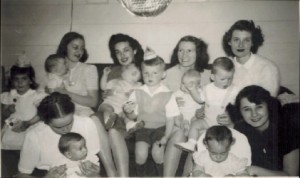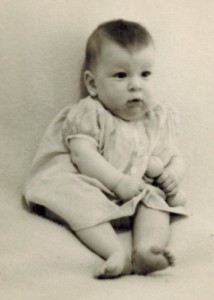3rd post. First years of marriage
With the war over, Eric started immediately to think of the future. He knew he wanted to go to graduate school, and either in English, which was his major in college, or Philosophy, which was a new love he acquired while reading Santayana’s ‘Skepticism and Animal Faith’ on the shores of Tripoli (one of his favorite war memories and one our children treasured). He was accepted to Yale in English and Harvard in Philosophy and chose the latter. And often regretted that decision. He was prone to accept challenge, and English seemed too easy and familiar, but literature was really his best love and he never achieved the master of philosophy that he desired. We had been thru a very rough, emotional summer and in retrospect I realize he was probably suffering from PTSD, a condition that was not yet recognized in 1945. I was keen to get married but he was facing an unknown future, and marriage was far from the top of his to-do list. We came close to breaking up until I realized that it was not that he didn’t love me, there was simply too much else he had to resolve first. So I backed off and suggested we just be friends and let the future resolve itself. And that was just fine. I was deeply in love and didn’t understand what was happening but my instincts worked well. Looking back I wonder that I was so in tune at 21; all I can say is that I loved him and couldn’t see life without him and was willing to do whatever he needed.I went up to Cambridge to visit him in October and by then he was ready and eager. His life was settled and the future clear and we decided to get married at Christmas. And then it was my turn to have doubts. But I kept them under control with the exception of one panic attack on our wedding day.
We were married on December 22, 1945. The wedding was supposed to be in the local Congregational Church, presided over by Robert Whitehead, Eric’s minister and a fine, thoughtful, liberal man who had great influence on him, including on his decision to become a conscientious objector. But both Eric and his Mom contracted a nasty flu a few days before and it almost had to be postponed. When it looked like they would be well enough, the venue was changed to my home. So it was crowded, but the company consisted of all the people we wanted to be there, and all went well. I remember enjoying the party and drinking a lot of champagne. But then I changed upstairs and as I was in the hallway dressed and ready to leave I had a serious panic attack. What was I doing??? We had never actually slept together, as the fear of pregnancy was terrifying for me, and it was before abortion was legalized. I was going off with my new husband into an uncharted future. I would have run if it were possible, but being well brought up, I shook myself back to reality and went downstairs and off by train to NYC. Our wedding night was spent at the Waldorf, my romantic idea. But it didn’t really matter where we went; as soon as we were off and away I was fine, the panic was over. I was a virgin and Eric was just-barely-not, and as scared as I was. The great change in social mores, about the acceptability of knowing your spouse intimately before marriage and even living together, came two decades later in the 60s. How we would have profited from that change! How taken-for-granted it is now! How sensible!]
Our apartment in Cambridge was one room and bath with a makeshift kitchen. Part of the ceiling fell down a few months later, just after the kitchen tap broke. Our water supply was a spout gushing from the wall for weeks. The landlord was a scumbag and I had to get the Health Department on him to get things fixed. The only redeeming feature was its location two blocks from Harvard Square and the subway. We live there for less than a year, during which time I found a job I loved at Mass. General Hospital in the Cytology Lab, managed to learn the essentials of wifehood, and got pregnant. So life continued to be challenging, somewhat scary, and always evolving. My boss at MGH was Ruth Graham, and it was the 2nd cytology lab in the country after Dr. George Papanicolaou’s in NY. We were very much pioneers and Ruth was iconic in my career. She had an MA (and later many honorary doctorates) and a husband and son, and was pregnant. Her lifestyle was brand new to me. She was a wonderful mentor as a forerunner in the wives-with-kids-and-careers movement, and the work we did was important and cutting edge.
I worked all thru my pregnancy, which was suddenly terminated at 8 months when I developed acute toxemia. Heath was delivered by Caesarian section a few days later, 10 months after we were married (lots of whispering about that). My parents came to Boston and took care of all details, including paying the hospital (a few hundred dollars then, now it would be a few thousand; still, we could not afford it.) And the birth itself reminds me vividly of how poor things were in 1946 for the two adults at center front. I was taken from a waiting room to the OR while Eric remained behind to wait for the outcome. The surgery went smoothly and I was soon in recovery wondering why Eric was not there with me. He was still pacing the floor and chain smoking in the room I left from and for 2 hours, noone in that hospital seemed to think how cruel that was. And we were both too inexperienced to realize how poorly we were treated. Meantime my parents had been informed and the news circulated thru both families, only the father was left in the dark. Today husbands can be participants from the start of pregnancy and be present during birth and all such humane treatment. My later pregnancies were better but still nothing like what is assumed acceptable today.
 We were totally unprepared for a baby, thinking there was a month to go.A one room apartment, no equipment, very little knowledge, no money and no income! But we had saved diligently and had $1500 to get us through the winter, and miraculously it did. Bemusing to think how far it would go now. As a family we were granted housing at Harvard Devens, an ex-Army post 40 miles west of Cambridge that had been converted into 2-bedroom apartments for married students, with a $50/month rent, and went off to live in the country for a year. As I write about the changes in our lives during this period I wonder that we managed to navigate thru them. All I can say is that the support of great parents and the resilience of the young are never to be underestimated. Both my parents and Eric’s Mom were absolutely there for us whenever needed help, and those first years were sure rocky. This photo of Mom and Dad (William and Lorna Nash Weinberg) was taken in Florida sometime around this period.
We were totally unprepared for a baby, thinking there was a month to go.A one room apartment, no equipment, very little knowledge, no money and no income! But we had saved diligently and had $1500 to get us through the winter, and miraculously it did. Bemusing to think how far it would go now. As a family we were granted housing at Harvard Devens, an ex-Army post 40 miles west of Cambridge that had been converted into 2-bedroom apartments for married students, with a $50/month rent, and went off to live in the country for a year. As I write about the changes in our lives during this period I wonder that we managed to navigate thru them. All I can say is that the support of great parents and the resilience of the young are never to be underestimated. Both my parents and Eric’s Mom were absolutely there for us whenever needed help, and those first years were sure rocky. This photo of Mom and Dad (William and Lorna Nash Weinberg) was taken in Florida sometime around this period.
Our year at Harvard-Devens was not any more serene but it was certainly different. We were a family, and in a community of graduate student families. The graduate community was a rich mix, but seemed dominated by business school students and they were not very exciting,such as our neighbors on one side. We really never knew them as business school males (were there any females???) were an inbred social group, but the walls were thin and we heard a lot about each other. What I remember best was that they acquired a Great Dane and named it Eric. It was winter so a recurring refrain was “On the paper, Eric” which became a phrase for me when my Eric was over the line! We did become good friends with our neighbors on the other side, Ruth and Mort Slater; their son Jonathan who was the same age as Heath. Mort was a brilliant mathematician but very unbalanced. He was hired by the University of Chicago and we saw them again several years later, but by then their marriage was very rocky and a divorce soon followed. I remember a Sunday dinner there when Ruth had blown her budget with a lamb roast. What an incredible treat. (Meat was one of the items we gave up for the war, and it was an amazing number of years before it was again available. In Cambridge whenever I saw a queue at the butcher shop I would join it and much later return home in triumph with a pound of ground beef.) I was longing for seconds but Ruth was adamant, they would feed on lamb for the rest of the week.
Some of the men became big names in their field – the women, tho, were all stay-at-homes. All were college graduates and most had unplanned babies, like ours. Female grad students at Harvard were perhaps the smallest minority in the country; I don’t recall a single Mom who was working on a degree. (Wonderful how that has changed.) The options for wives were very limited, very few had cars, money or any kind of day care. The winter was long and dreary and what I did mostly was read. Eric’s library was one of our most cherished items and I devoured all of Dickens, Jane Austen, the Brontes and George Eliot, plus many of Trollope’s novels and Tom Jones. The barracks complex was way out in the country at the edge of the town of Fort Devens; there was a grocery store and little else. It was on a R.R. line so we were connected, but not very. When spring came we could at least talk walks with the babies in strollers but I remember very few get togethers like the one shown here. Must have been a birthday party.
The barracks complex was way out in the country at the edge of the town of Fort Devens; there was a grocery store and little else. It was on a R.R. line so we were connected, but not very. When spring came we could at least talk walks with the babies in strollers but I remember very few get togethers like the one shown here. Must have been a birthday party.
Heath and me-top left; Ruth and Jonathan in front of us.

Heath was an easy baby and loved to sleep. I would go in and make noises to try to wake her, as she was my best (and favorite) companion. But she was just an object to Eric, who had no familiarity with babies. But when she was 7 months old we took her to a neighbor who was a photographer to have a portrait done for the family. We propped her up on a couch but she couldn’t really sit firmly and kept toppling over, which made her giggle, and made her young Dad see her as a person for the first time. The light bulb went on and he realized she was not only a real human but a very cute one. Here is one of the photos.
Eric had some serious academic ups-and-downs during the year and was told by his advisor (Clarence Lewis) at one point that he should settle for an MA; he suggested that he become a librarian rather than go on for a PhD in Philosophy. Then he wrote a paper on Kant that made Professor Lewis do a 180 0 turn around; he even invited us to live with him but backed off when he learned we had a baby (a great relief to us). Even so, the whole scene at Harvard was not comfortable for Eric and decided not to stay on. He got a job teaching English at Syracuse so he could re-group.
We had used most of our savings so we needed money badly. Eric got a job hauling garbage for the summer and I went back to Ruth’s lab. Heath went to Lake Buel with my parents for a month and I regretted that necessity for a long time after, as when I went to get her she had change so much I realized what an important piece of here growth I had missed. Erika (Eric’s Mom) came for August and that was much better. Once again our parents helped immeasurably, how could we have survived without them???
